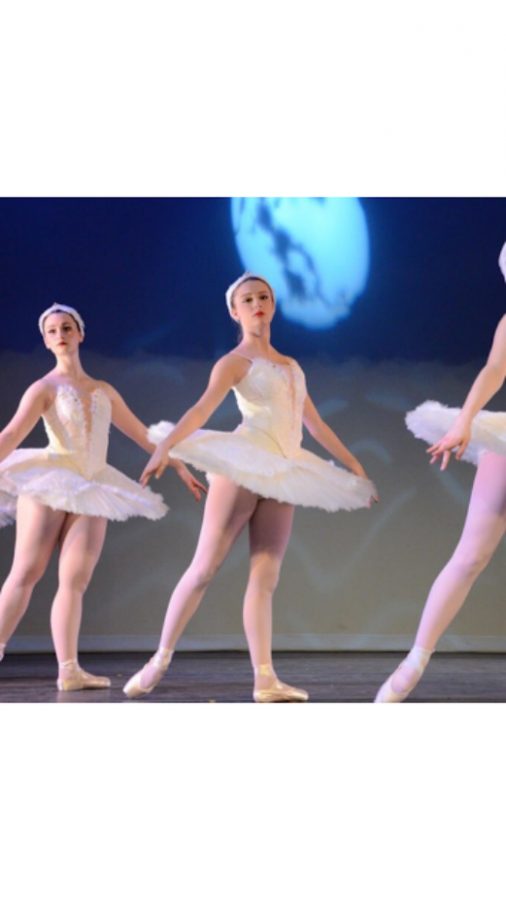Toes aren’t always the pointe: How dancing affects the life of a dancer
March 12, 2017
Several debates occur around the world on if dance is truly a sport or not. The discussion that does not happen, however, is how dancing truly impacts the life of the person involved.
Dance is a huge time commitment that significantly impacts dancers’ lives. “Dance takes up all of my time. I am basically at home doing homework or at ballet and it is a huge time commitment,” says Elise Voinaroski (10). Despite the monotonous rehearsals, tiring shows, and several hours of stretching, it may feel to the person that their hard work is hurting them in more ways than helping. However, that is not always the case. According to Psychology Today, dancing improves brain function on a variety of levels. Two recent studies show how different types of practices allow dancers to achieve peak performance by blending cerebral and cognitive thought processes with muscle memory and ‘proprioception’ held in the cerebellum. The cerebellum is the the part of the brain that helps with muscular movement throughout the body. By continuously practicing these dance moves, dancers not only create a better muscle memory, but an overall better memory as well. “Dance has helped with my memory a lot. I’ve been able to retain movements and patterns much better due to the process of learning numerous dances at the same time,” says Nirvan Singh (12). Learning various dances leads to a better memory that can help in more ways than just dance and ultimately can have an impact on success later on. Misty Copeland, dancer for the American Ballet Theatre, said, “I learned how to communicate and articulate myself from ballet. It’s just insane to me, when they don’t think of that as a part of our education.” Dance truly impacts the thinking patterns of the person who is involved and allows for growth in more ways than ballet.
Time management is a difficult concept that several high schoolers fail to grasp before their years at college, but dance can help with that, too. “Dance has helped me with my time management immensely. Since I am dancing so often, I really have to plan out all of my school work and when I’m going to do it especially on the weekends. I dance five hours on Saturdays and roughly 3 to 4 hours on Sundays,” says Voinaroski. Dance is a huge time commitment that causes some to arrange their whole schedule around it. This has a huge impact on students’ lives, especially since most have been practicing this art ever since they were little. In fact, according to the Elite Daily, dancers learn to balance, prioritize, multitask and make sacrifices. In order to succeed in college (or any given career), time management will unquestionably provide these well-prepared students with relief. This gives dancers a giant step ahead of others when it comes to their success later on.
Not only does dance help with memory and time management, but it has also helped dancers become better versions of themselves. “Dance has affected my life by giving me a better perspective of my life and what things matter most. I prioritize happiness, a healthy lifestyle, and selflessness above everything now,” says Singh. This allows for a greater appreciation for all of the things involved in the person’s life. “Ballet became this escape for me. I feel like I was on my own a lot. I was searching for stability, so I was going off on my own and imagining what I thought stability was. Ballet became a way for me to cope,” says Copeland. For some, dance is the only method to get away from the struggles of society. This in turn allows for growth in themselves causing them to become stronger because they can let go of their consistent problems throughout their “real lives.”
Dance may always be argued and debated about for being a sport or not, but one thing that will always hold true to a dancer’s life is the effect that the art has on them. “I am very grateful for dance because it has taught me a lot about myself and it’s just a great thing that I have in my life,” says Voinaroski. While they might be “dancing like nobody’s watching” now, teenage dancers might be positing themselves, through their time and dedication, to succeed well beyond the stage in their time after high school.
http://www.azquotes.com/author/41458-Misty_Copeland
https://www.psychologytoday.com/blog/the-athletes-way/201310/why-is-dancing-so-good-your-brain
http://elitedaily.com/life/5-things-learned-discipline-professional-ballerina/
https://www.brainyquote.com/quotes/quotes/m/mistycopel749694.html









